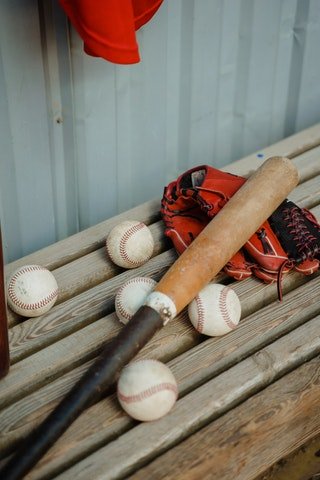With Major League Baseball having just started its latest season on April 7th, following the apparent resolution of a stalemate between the league and its players, what better time for a chorus of Take Me Out To The Ball Game as we look back at an early attempt to drum up enthusiasm for what has been termed America's game on our own shores, with help from more than a few Football League clubs!
As you may or may not have guessed Derby boasted perhaps the most successful English team to swing a bat, as an offshoot of County who played at the Baseball Ground from 1895 to 1997. This after Francis Ley, the owner of the land, had returned from an 1889 business trip to the United States head over heels for baseball and promptly gone about setting up a club just a year before the foundation of the National Baseball League of Great Britain and Ireland.
Unsurprisingly, Ley is probably at the forefront of MLB's own history of English baseball. “He was a noted cricket fan, but county cricket would take days to play meaning only the idle rich could play such a sport. But, Ley learned, the faster and more intense baseball games could be played in just a few hours – making them a cricket relative that Ley and his employees could take part in.
So, when Ley returned to Derby County in England, he went and built an actual baseball field for his workers to use in 1889 – the first of its kind in the country.
But he didn’t stop with a modest company team and small stadium. Soon, Ley brought in an American coach to help teach his employees the game more intimately. He also imported American players to boost their on-field talents (Ley was pragmatic and made sure they had the necessary skills to work in his factory, too.)
Put that all together and it made Ley’s team a cornerstone for the first ever professional baseball season in Britain in 1890.”
However, where the intention was for eight teams to quite literally step up to the plate there were just four- Derby joined by Aston Villa, Preston North End and Stoke. To date this inaugural tournament remains the only professional British baseball championship- Aston Villa (sometimes known as Birmingham AV as that was what was emblazoned on their jerseys) crowned winners with a team containing several men perhaps better known for their ability on the football pitch in Arthur Brown, James Cowan, Fred Dawson, Abel, John, Harry and Will Devey.
John would go on to become the club's most successful captain, but as Joe Gray, author of ‘What About The Villa? Forgotten Figures From Britain's Pro Baseball League Of 1890’, pitched in- “Devey’s first exposure as an Aston Villa player was actually on the baseball field, not on the football field, and this was a guy who went on to captain Aston Villa during the 1890s when they won five league titles and two FA Cups.
He was the captain when they won the double in 1897. He was one of the all-time Aston Villa greats, who actually played baseball for them first- he was a brilliant baseball player, who led the statistical categories at the end of the year, including being the league’s batting champion.”
Joining them were player/ manager William Barr, his namesake Frank, player/ coach H.E Simon, Joey Simmonds, Frank Stevenson and Harry Widdowson. The Birmingham Mail would later remember that “just three years before the Claret and Blues became the “greatest football club in the world”, Villa were the only ever winners of a professional national baseball league in England.
Villa were in danger of dropping out of the First Division when American entrepreneur Albert Spalding took Major League baseball players on a world tour which stopped off in Britain. “
Derby, who actually led the league for much of the season before withdrawing, boasted a roster including County keeper Dan Allsop alongside a couple of Americans in the shape of Sim Bullas of the Toledo Blue Stockings and American Indian War veteran William C Bryan. Probably taking advantage of the offer of a £15 per month wage plus travel expenses following an appeal to Spalding, who had played for the Boston Red and Chicago White Stockings before moving on to help organise the National League.
This had brought together Chicago and Boston alongside the Philadelphia Athletics, Hartford Dark Blues, New York Mutuals, St Louis Brown Stockings, Cincinatti Reds and Louisville Grays- the Athletics and Red Stockings playing each other in the new league's first game on April 22, 1876 as Boston won 6-5.
Little wonder then that those looking to do similar in England turned to him! Another of the American imports, Leech Maskrey, would sign on as player/ coach for a Preston team rounded out with more than a few of North End's famed Invincibles who'd gone unbeaten in the first season of the Football League itself, 1888-89.
Goalkeeper James Trainer joined Samuel Dobson, George Drummond, Billy Hendry, Moses Sanders and William Stewart in keeping themselves fit off the football pitch, moonlighting as baseball players at the behest of North End chairman William Sudell. Stoke's line- up boasting their own keeper and later manager Bill Rowley alongside William Dunn, John Eccles, Edgar Montford, Wilmot Turner and Alf Underwood among those drawn from City's footballing ranks under player/ coach Charles B. Bartlett.
The Lillywhites and Potters would end the campaign second and third respectively, after Derby were expelled from the league amid concerns over unfair advantage in using more American professional players than their rivals- “owing to the decision of the National League requiring the Derby club to not pitch Reidenbach, the American pitcher, in remaining championship matches, the Derby club have withdrawn from the league.” as the Derbyshire Advertiser & Journal reported.
“That’s obviously not a great start to a nascent league.” as MLB would note!

